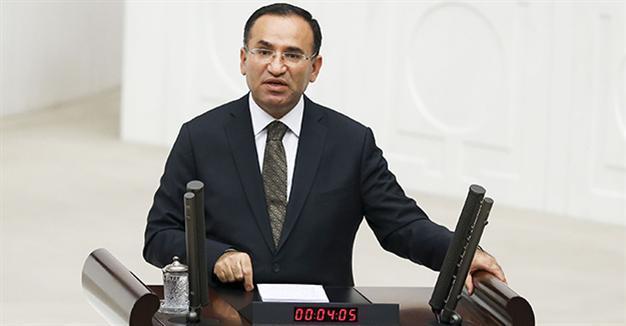Turkey’s opposition objects to intel agency’s exception in draft law
Turan Yılmaz - ANKARA

Justice Minister Bekir Bozdağ, AA Photo.
Exceptions granted to Turkey’s intelligence agency in a government-led draft law on the “Protection of the Personal Data” have led to debate between the ruling Justice and Development Party (AKP) and opposition parties.
“Can there be any intelligence organization that is not able to reach data?” Justice Minister Bekir Bozdağ asked in response to the oppositions’ criticism, while speaking at parliament late Feb. 17.
But the justice minister’s explanations were apparently not satisfactory and convincing for the opposition deputies.
“Let alone personal data, we are face to face with a style of governance which cannot even protect the state’s public data,” said Kadir Koçdemir, the Bursa deputy of the Nationalist Movement Party (MHP).
In no countries of the world are intelligence services specifically trained in registering personal data, Bozdağ said, adding that the same should also be valid for the National Intelligence Organization (MİT) of Turkey.
“It is an exception imperatively made due to the country’s security,” Bozdağ argued. “This is not a law for blacklisting. This law is an antidote for blacklisting,” he said.
“Collecting personal data before ‘the Board of Protection of Personal Data’ or in a place they find appropriate or in a pool at ‘the Institution for ‘Protection of Personal Data’ is out of question. There is no such pool. Every institution and every natural or legal person is obligated to build a mechanism for protecting data it registered and save the data for a period outlined by laws. If you ask me, the most important innovation that this law brings … is identifying those who are responsible for personal data,” he added, during general assembly debates on the draft.
Meanwhile, the main opposition Republican People’s Party (CHP) fiercely objected to the draft, claiming it was even worse than what was described in George Orwell’s dystopian novel, “1984.”
“This law will turn out even worse than George Orwell’s famous novel ‘1984’. Orwell has been proven right. In history, before ‘1984’ was published, many persons and many rulers attempted to build administrations similar to what Orwell described. But according to my knowledge, none of the attempts on this issue have performed as high as the one [done] by the AKP government,” CHP Eskişehir deputy Cemal Okan Yüksel said.
The CHP deputy’s comments were protested by AKP deputies, who turned their backs to the rostrum.
Back in December 2013, a top state body working under President Abdullah Gül, acknowledged that Turkey did not adequately protect its citizen’s personal information due to the indifference of public institutions and legal shortcomings, and that Turkey needed a substantial increase in awareness and a legal framework to specifically address the issue.
Some government institutions share people’s personal data online with other public and private bodies without taking precautions to ensure data security, according to a State Audit Board’s (DDK) 2013 report.
Nonetheless, only four months later, Gül approved a bill expanding the powers and immunities of the MİT amid strong reactions from opposition parties, which argued that the bill will turn the country into “an intelligence state.”
The bill, led by then-Prime Minister Erdoğan’s government, was much criticized by opposition parties on the grounds that it would increase the MİT’s powers without adequate checks and balances.
The legislation, passed by parliament after heated debate, gave the MİT the power to tap private phone conversations and collect intelligence related to terrorism and international crimes.
It also offered spy agents greater immunity from prosecution and allowed for prison terms of up to 10 years for journalists and others who published leaked information.
One of the most controversial articles of the bill stipulated that any citizen who fails to provide a document or information that the MİT requests will be tried for up to four years in prison.
